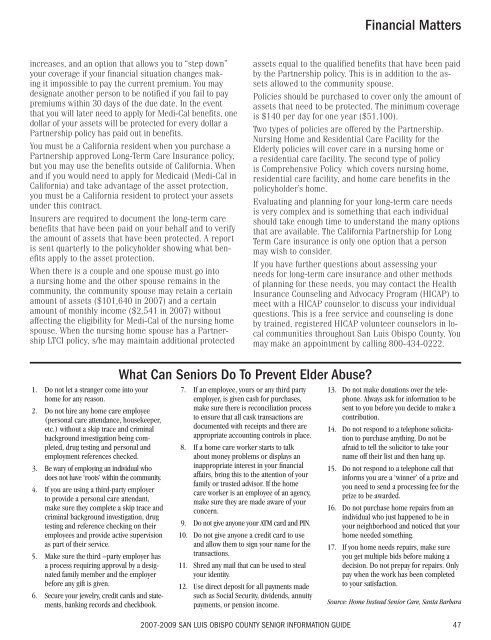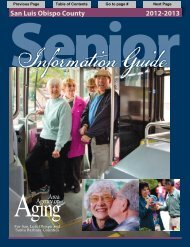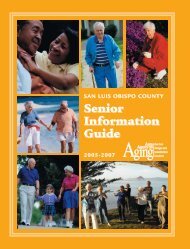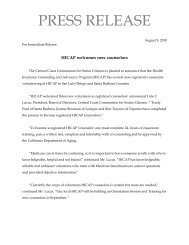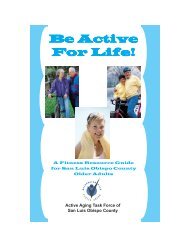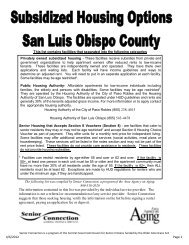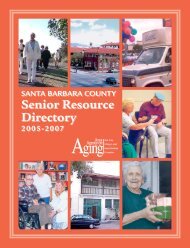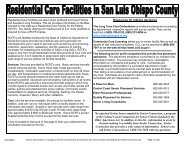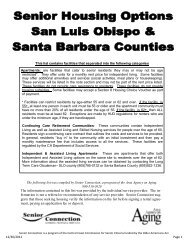SAN LUIS OBISPO COUNTY Senior Information Guide
SAN LUIS OBISPO COUNTY Senior Information Guide
SAN LUIS OBISPO COUNTY Senior Information Guide
You also want an ePaper? Increase the reach of your titles
YUMPU automatically turns print PDFs into web optimized ePapers that Google loves.
increases, and an option that allows you to “step down”<br />
your coverage if your fi nancial situation changes making<br />
it impossible to pay the current premium. You may<br />
designate another person to be notifi ed if you fail to pay<br />
premiums within 30 days of the due date. In the event<br />
that you will later need to apply for Medi-Cal benefi ts, one<br />
dollar of your assets will be protected for every dollar a<br />
Partnership policy has paid out in benefi ts.<br />
You must be a California resident when you purchase a<br />
Partnership approved Long-Term Care Insurance policy,<br />
but you may use the benefi ts outside of California. When<br />
and if you would need to apply for Medicaid (Medi-Cal in<br />
California) and take advantage of the asset protection,<br />
you must be a California resident to protect your assets<br />
under this contract.<br />
Insurers are required to document the long-term care<br />
benefi ts that have been paid on your behalf and to verify<br />
the amount of assets that have been protected. A report<br />
is sent quarterly to the policyholder showing what benefi<br />
ts apply to the asset protection.<br />
When there is a couple and one spouse must go into<br />
a nursing home and the other spouse remains in the<br />
community, the community spouse may retain a certain<br />
amount of assets ($101,640 in 2007) and a certain<br />
amount of monthly income ($2,541 in 2007) without<br />
affecting the eligibility for Medi-Cal of the nursing home<br />
spouse. When the nursing home spouse has a Partnership<br />
LTCI policy, s/he may maintain additional protected<br />
1. Do not let a stranger come into your<br />
home for any reason.<br />
2. Do not hire any home care employee<br />
(personal care attendance, housekeeper,<br />
etc.) without a skip trace and criminal<br />
background investigation being completed,<br />
drug testing and personal and<br />
employment references checked.<br />
3. Be wary of employing an individual who<br />
does not have ‘roots’ within the community.<br />
4. If you are using a third-party employer<br />
to provide a personal care attendant,<br />
make sure they complete a skip trace and<br />
criminal background investigation, drug<br />
testing and reference checking on their<br />
employees and provide active supervision<br />
as part of their service.<br />
5. Make sure the third –party employer has<br />
a process requiring approval by a designated<br />
family member and the employer<br />
before any gift is given.<br />
6. Secure your jewelry, credit cards and statements,<br />
banking records and checkbook.<br />
7. If an employee, yours or any third party<br />
employer, is given cash for purchases,<br />
make sure there is reconciliation process<br />
to ensure that all cask transactions are<br />
documented with receipts and there are<br />
appropriate accounting controls in place.<br />
8. If a home care worker starts to talk<br />
about money problems or displays an<br />
inappropriate interest in your fi nancial<br />
affairs, bring this to the attention of your<br />
family or trusted advisor. If the home<br />
care worker is an employee of an agency,<br />
make sure they are made aware of your<br />
concern.<br />
9. Do not give anyone your ATM card and PIN.<br />
10. Do not give anyone a credit card to use<br />
and allow them to sign your name for the<br />
transactions.<br />
11. Shred any mail that can be used to steal<br />
your identity.<br />
12. Use direct deposit for all payments made<br />
such as Social Security, dividends, annuity<br />
payments, or pension income.<br />
Financial Matters<br />
assets equal to the qualifi ed benefi ts that have been paid<br />
by the Partnership policy. This is in addition to the assets<br />
allowed to the community spouse.<br />
Policies should be purchased to cover only the amount of<br />
assets that need to be protected. The minimum coverage<br />
is $140 per day for one year ($51,100).<br />
Two types of policies are offered by the Partnership.<br />
Nursing Home and Residential Care Facility for the<br />
Elderly policies will cover care in a nursing home or<br />
a residential care facility. The second type of policy<br />
is Comprehensive Policy which covers nursing home,<br />
residential care facility, and home care benefi ts in the<br />
policyholder’s home.<br />
Evaluating and planning for your long-term care needs<br />
is very complex and is something that each individual<br />
should take enough time to understand the many options<br />
that are available. The California Partnership for Long<br />
Term Care insurance is only one option that a person<br />
may wish to consider.<br />
If you have further questions about assessing your<br />
needs for long-term care insurance and other methods<br />
of planning for these needs, you may contact the Health<br />
Insurance Counseling and Advocacy Program (HICAP) to<br />
meet with a HICAP counselor to discuss your individual<br />
questions. This is a free service and counseling is done<br />
by trained, registered HICAP volunteer counselors in local<br />
communities throughout San Luis Obispo County. You<br />
may make an appointment by calling 800-434-0222.<br />
What Can <strong>Senior</strong>s Do To Prevent Elder Abuse?<br />
13. Do not make donations over the telephone.<br />
Always ask for information to be<br />
sent to you before you decide to make a<br />
contribution.<br />
14. Do not respond to a telephone solicitation<br />
to purchase anything. Do not be<br />
afraid to tell the solicitor to take your<br />
name off their list and then hang up.<br />
15. Do not respond to a telephone call that<br />
informs you are a ‘winner’ of a prize and<br />
you need to send a processing fee for the<br />
prize to be awarded.<br />
16. Do not purchase home repairs from an<br />
individual who just happened to be in<br />
your neighborhood and noticed that your<br />
home needed something.<br />
17. If you home needs repairs, make sure<br />
you get multiple bids before making a<br />
decision. Do not prepay for repairs. Only<br />
pay when the work has been completed<br />
to your satisfaction.<br />
Source: Home Instead <strong>Senior</strong> Care, Santa Barbara<br />
2007-2009 <strong>SAN</strong> <strong>LUIS</strong> <strong>OBISPO</strong> <strong>COUNTY</strong> SENIOR INFORMATION GUIDE 47


